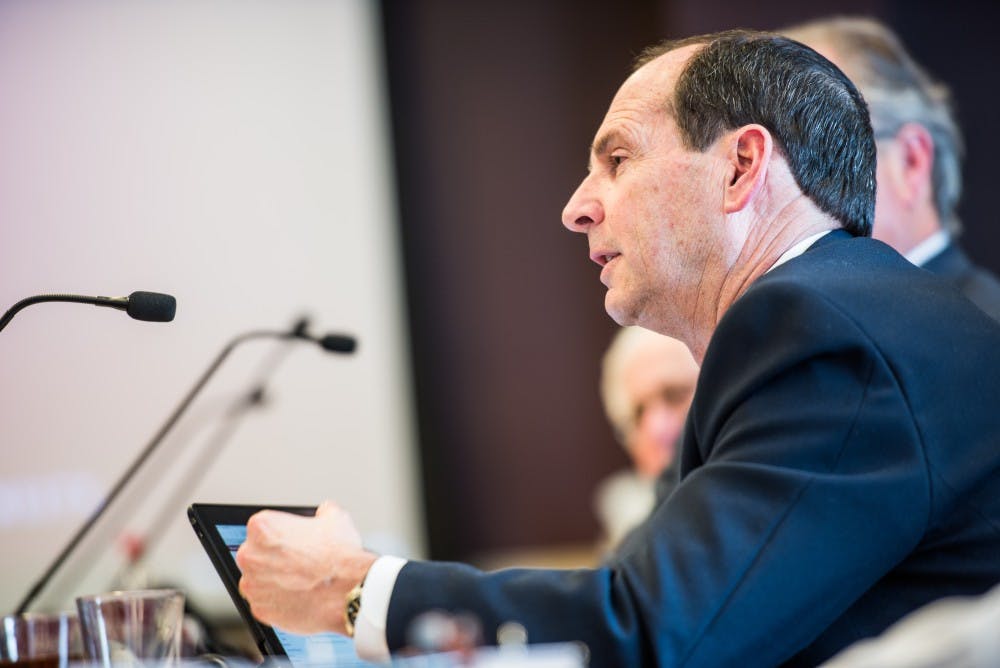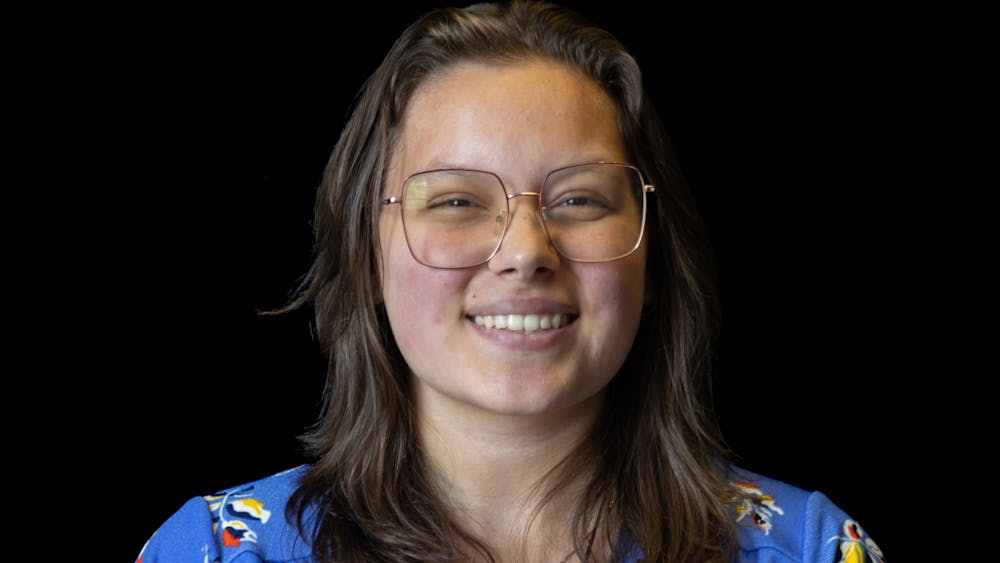Trustees discuss graduation rates at committee meeting

Faculty expressed their concerns with the board of trustees about the Academic Reorganization Initiative, graduation rates, and the availability of summer classes during the Trustees-Faculty Liaison Committee meeting April 18.
Trustees participated in committee meetings the day before their formal meeting at 8:30 a.m. April 19 in the President's Conference Room in the Bovee University Center.
The Trustees-Faculty Liaison Committee meeting included a Point of Pride presentation from Teacher Education and Professional Development faculty member Kevin Cunningham. Following the presentation was a time for open discussion between the the board and the faculty in attendance.
Cunningham's presentation discussed the STEM Education Scholars Program in the Herbert H. & Grace A. Dow College of Health Professions. High school seniors apply to be in the program and, if accepted, get to be members for their entire college career.
The program provides the opportunity for students to learn about STEM from faculty, the opportunity to teach STEM to children in a low-stakes situation, and a community of other students interested in STEM education.
During the open discussion, sociology faculty member Mary Senter said she is concerned about the budgetary impact of the academic reorganization.
Counseling and Special Education faculty member Susan Shellady said she and other faculty members are unsure about how the implementation process will go.
The conversation shifted to graduation rates.
Senter said there is pressure on students to graduate in four years, but it isn't always possible. She said students feel like they are failures if they can't finish college in four years.
Trustee Michael Sandler said students aren't forced to graduate in four years, but rather have the option to graduate in four years if they are ready.
Shellady said part of the reason students can't graduate on time is because of the uncertainty of summer classes. Some students rely on summer classes to graduate in a timely manner without taking 21 credits each semester, but a lot of classes are cancelled if they don't get enough students to register.
Academic and Student Affairs Committee
The Academic and Student Affairs Committee meeting focused on academic reorganization, strategic planning and the CHP.
Academic reorganization would include transforming larger departments into smaller, more focused departments, said Senior Vice Provost for Academic Reorganization Initiative Ian Davison. A small number of faculty would move from one college to another.
Colleges and departments voted in support of the recommendations, Davison said. The proposals will go to the board at its June meeting.
The new departments will have to write bylaws, which will need administrative approval. These departments are expected to be “fully functional” by the fall of 2019, Davison said.
Other organizational changes include consolidating the three testing centers into one center in the library and making advising mandatory for all students.
Vice President for Enrollment and Student Services Steven Johnson went over key elements of the strategic plan, including reaching out to target audiences.
The plan includes looking at a complete audience rather than just traditional audience, Johnson said. Three key audiences include community college students, low-income first generation college students and out-of-state students.
CHP Dean Thomas Masterson gave a presentation on changes in the college.
The Student Service Center, which launched in 2016, saw 942 advising appointments, 1080 instances of “foot traffic” and 890 phone calls in the 2016-17 academic year. In the Fall 2017 semester, the Student Service Center had 942 advising appointments, 1280 instances of foot traffic and 1368 phone calls.
The Master of Public Health online program is set to launch in Fall 2018. The Bachelor of Science in Nursing Completion online program is set to launch in Fall 2019 — the BSN program would allow registered nurses to earn BSNs in 32 credit hours online.
Finance and Facilities Committee
The Finance and Facilities Committee had a light agenda at its session. The committee discussed plans to replace the chilled water lines in Lot 62 near the Student Activity Center.
Since the parking lot will be ripped up to replace the pipes, Lot 62 will be updated and reconfigured to include more spaces and decrease car accidents, said Associate Vice President for Facilities Management Jonathan Webb.
The reconfigured lot will put parking spaces along the sidewalk to separate the sidewalk and the drive, which Webb believes will improve safety for pedestrians.
By reconfiguring the parking lot, Webb said there will be 59 more parking spaces in Lot 62.
The committee also discussed extending an electrical contract, which has fixed rates, and building an above-ground fueling station for university vehicles.
Trustee-Student Liaison Committee
New Student Government Association President Jake Hendricks and Vice President Lyndi Rose were introduced to the board. The two will be inaugurated on at 6 p.m. April 27 in the UC Rotunda.
Hendricks and Rose summarized their platform — civic engagement, inclusivity, active citizenship and sustainability.
Program Board President Galen Miller and Residential Hall Assembly Director Mary Saint John were also introduced to the board.
"I am impressed by the enthusiasm," said trustee Richard Studley.
Staff Reporters Rob Linsley and Isaac Ritchey contributed to this article.




